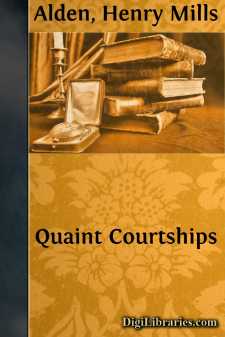Categories
- Antiques & Collectibles 13
- Architecture 36
- Art 48
- Bibles 22
- Biography & Autobiography 813
- Body, Mind & Spirit 142
- Business & Economics 28
- Children's Books 16
- Children's Fiction 13
- Computers 4
- Cooking 94
- Crafts & Hobbies 4
- Drama 346
- Education 46
- Family & Relationships 57
- Fiction 11829
- Games 19
- Gardening 17
- Health & Fitness 34
- History 1377
- House & Home 1
- Humor 147
- Juvenile Fiction 1873
- Juvenile Nonfiction 202
- Language Arts & Disciplines 88
- Law 16
- Literary Collections 686
- Literary Criticism 179
- Mathematics 13
- Medical 41
- Music 40
- Nature 179
- Non-Classifiable 1768
- Performing Arts 7
- Periodicals 1453
- Philosophy 64
- Photography 2
- Poetry 896
- Political Science 203
- Psychology 42
- Reference 154
- Religion 513
- Science 126
- Self-Help 84
- Social Science 81
- Sports & Recreation 34
- Study Aids 3
- Technology & Engineering 59
- Transportation 23
- Travel 463
- True Crime 29
Quaint Courtships
Categories:
Description:
Excerpt
Introduction
To the perverse all courtships probably are quaint; but if ever human nature may be allowed the full range of originality, it may very well be in the exciting and very personal moments of making love. Our own peculiar social structure, in which the sexes have so much innocent freedom, and youth is left almost entirely to its own devices in the arrangement of double happiness, is so favorable to the expression of character at these supreme moments, that it is wonderful there is so little which is idiosyncratic in our wooings. They tend rather to a type, very simple, very normal, and most people get married for the reason that they are in love, as if it were the most matter-of-course affair of life. They find the fact of being in love so entirely satisfying to the ideal, that they seek nothing adventitious from circumstance to heighten their tremendous consciousness.
Yet, here and there people, even American people, are so placed that they take from the situation a color of eccentricity, if they impart none to it, and the old, old story, which we all wish to have end well, zigzags to a fortunate close past juts and angles of individuality which the heroes and heroines have not willingly or wittingly thrown out. They would have chosen to arrive smoothly and uneventfully at the goal, as by far the greater majority do; and probably if they are aware of looking quaint to others in their progress, they do not like it. But it is this peculiar difference which renders them interesting and charming to the spectator. If we all love a lover, as Emerson says, it is not because of his selfish happiness, but because of the odd and unexpected chances which for the time exalt him above our experience, and endear him to our eager sympathies. In life one cannot perhaps have too little romance in affairs of the heart, or in literature too much; and in either one may be as quaint as one pleases in such affairs without being ridiculous.
W.D.H.
AN ENCORE
BY MARGARET DELAND
According to Old Chester, to be romantic was just one shade less reprehensible than to put on airs. Captain Alfred Price, in all his seventy years, had never been guilty of airs, but certainly he had something to answer for in the way of romance.
However, in the days when we children used to see him pounding up the street from the post-office, reading, as he walked, a newspaper held at arm's length in front of him, he was far enough from romance. He was seventy years old, he weighed over two hundred pounds, his big head was covered with a shock of grizzled red hair; his pleasures consisted in polishing his old sextant and playing on a small mouth-harmonicon. As to his vices, it was no secret that he kept a fat black bottle in the chimney-closet in his own room; added to this, he swore strange oaths about his grandmother's nightcap. "He used to blaspheme," his daughter-in-law said, "but I said, 'Not in my presence, if you please!' So now he just says this foolish thing about a nightcap." Mrs. Drayton said that this reform would be one of the jewels in Mrs....





